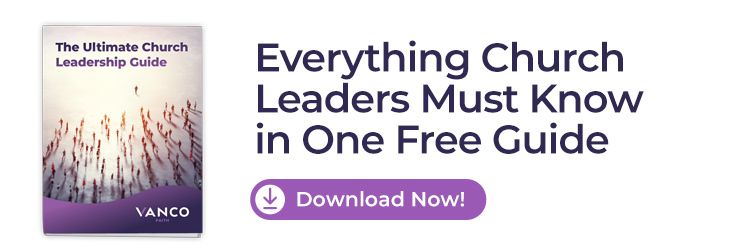
There are plenty of verses about stewardship in the Bible, from the powerful words of Acts 20:35 to the guidance offered in Peter 4:10. Because there’s no shortage of scriptures on stewardship, you can probably guess that stewardship is one of the core values of Christianity — but connecting texts on stewardship to church fundraising strategies can feel challenging even for the most faithful individual.
We’re here to help if you want to promote church development following biblical stewardship principles. Read more to learn about elevating church fundraising by following scriptures on stewardship that will inspire!
Table of Contents
- Biblical Foundations of Stewardship
- Role of Leadership in Fostering a Culture of Stewardship
- Implementing Scriptural Principles in Church Fundraising
- Testimonials and Case Studies
- Key Takeaways: The Future of Church Finances and Stewardship
- FAQs
Biblical Foundations of Stewardship
Biblical stewardship is a well-documented value that you’ll find mentioned throughout the Bible, and honoring biblical stewardship principles is a key element of transforming a modern Church. Here’s what you should know about the biblical foundations of stewardship.
Proper Time for Stewardship
As you’ll find in Ecclesiastes 3:1, “There is a time for everything and a season for every activity under the heavens.” Knowing the proper time for stewardship is essential for a church leader looking to promote church development through fundraising efforts.
One of the core instances where stewardship is necessary is during the planning and decision-making process for your fundraising activities. Regardless of your endeavor, stewardship allows you to understand the long-term effects of your fundraising decisions to ensure your resources are used sustainably — meaning you’ll have a better chance of success.
Types of Stewardship
A faithful servant must understand the types of stewardship outlined in the Bible. Two instances of biblical stewardship can be found in Genesis 1:28 and Matthew 25:1-46.
According to Genesis, “God blessed them and said to them, ‘Be fruitful and increase in number; fill the earth and subdue it. Rule over the fish in the sea and the birds in the sky and over every living creature that moves on the ground.’” This understanding of stewardship shows that the true riches of life are found in every action, and servants of God constantly live out the principles of stewardship.
Matthew 25:1-46 asks, “Lord, when did we see you hungry and feed you, or thirsty and give you something to drink? When did we see a stranger and invite you in, or needing clothes and clothe you? When did we see you sick or in prison and go to visit you?”
God answers: “Whatever you did for one of the least of these brothers and sisters of mine, you did for me.” This scripture on stewardship shows that we are serving God through all our stewardship actions — even in things as simple as our church fundraising efforts.
Biblical Scriptures on Stewardship
Examples of stewardship are found throughout the Bible. Let’s take a look at a few crucial verses, starting with Acts 20:35. This verse states, “In everything I did, I showed you that by this kind of hard work we must help the weak, remembering the words the Lord Jesus himself said: ‘It is more blessed to give than to receive.’” Giving through your fundraising efforts exposes the worldly riches of giving, as when you give to others, you give to the Lord.
Another crucial example of stewardship is Psalm 24:1: “The earth is the Lord’s, and the fullness thereof; the world, and they that dwell therein.” The world belongs to God, and by serving the world and its inhabitants, you serve the Lord through your fundraising actions.
One final key scripture on stewardship is found in 1 Peter 4:10, which explains how God’s servants should practice stewardship: “Each of you should use whatever gifts you have received to serve others, as faithful stewards of God’s grace in its various forms.” As the Lord blesses you with gifts, you must share this goodness with others as a church leader through the modern church management tools at your disposal.
Role of Leadership in Fostering a Culture of Stewardship

Church leaders have a massive responsibility to foster a culture of stewardship among worshippers. Leading by example is critical to following scriptures on stewardship from the Bible. As leaders, you set the tone by providing churchgoers with the vision and values they follow to promote a culture of stewardship. However, you must go beyond this to model stewardship behaviors in everything you do.
Leading by example is one of the most critical steps of being a church leader. Leaders who demonstrate responsibility and accountability are more likely to inspire other followers of the Lord to give back to their communities tenfold.
Leaders must also incorporate stewardship principles into their strategic planning efforts through organized fundraising initiatives or church management software to enhance their institutions’ stewardship efforts. Leading is all about fostering a culture of continuous improvement — there’s always room to grow how you serve the Lord and your community.
Implementing Scriptural Principles in Church Fundraising
Being a faithful servant requires implementing scriptures on stewardship and biblical stewardship principles in all your actions. Applying stewardship principles in modern church contexts is possible if you understand the importance of fundraising efforts to improve your community, including your church building, which can be an important part of that community.
Here are a few ways to implement scriptural principles in your church fundraising efforts.
Spiritual Gifts and Their Proper Use in Stewardship
Spiritual gifts are some of the most important elements of church fundraising and giving back to your community. Some spiritual gifts you can offer your church members to promote faithful service include the following:
- Faith
- Giving
- Knowledge
- Leadership
- Prophecy
- Mercy
- Hospitality
- Speaking in tongues and interpretation of tongues
- Healing
- Serving
- Wisdom
- Teaching or shepherding
Promoting stewardship requires you and the Lord’s followers to identify and acknowledge spiritual gifts through prayer, self-reflection and guidance — but you need to understand your spiritual gifts to ensure responsible stewardship.
The main goal of spiritual gifts is to serve other people and bring value to the community, and one must use their spiritual gifts selflessly rather than for personal gain. The spiritual gifts you promote as a church leader must align with your overall purpose, contributing to unity and church development. Emphasize a culture of shared responsibility.
Strategies for Teaching and Promoting Stewardship
Teaching and promoting stewardship throughout your church is essential to living out scriptures on stewardship in your fundraising efforts. Stewardship can be understood through educational programs at your church led by volunteers to organize concrete efforts for living out stewardship through community fundraising.
You can also promote stewardship through a sermon series on stewardship. These sermons focus on stewardship as a core value of the church and the Christian faith, emphasizing that one cannot live out the values of the Lord without being a steward.
Stewardship Letters and Communication
Stewardship letters are another excellent way to implement scriptural principles in fundraising. These letters are messages from your church thanking individuals who have provided services and contributions to fundraising efforts, essentially commending them for remaining faithful to the church and God’s mission.
Some tips for writing effective stewardship letters include:
- Pay attention to how you address your letters, such as the accuracy of details like the mailing address, date of the letter’s composition, recipient’s name and title, and salutations.
- Express sincere appreciation for the member’s contributions to fundraising efforts, using an opening statement that is kind, clear, factual and brief. Consider using an anecdote for a strong emotional appeal or show factual results of how fundraising contributions have helped your church.
- Explain what fundraising efforts support, listing concrete examples of how the individual’s contributions have improved the church.
- Explain your church’s current financial needs and fundraising efforts.
- Present the reason for your letter, including details like the amount you’re asking for in graduated amounts, flexible payment options and methods, or a blank line for write-in amounts.
- Explain your upcoming goals and mission for the church.
- Tie everything together with a powerful closing message, reiterating the importance of the individual’s stewardship efforts
Testimonials and Case Studies
Services like Vanco provide resources for online giving for churches through custom church apps. For instance, Vanco has helped Shadow Rock Congregational United Church of Christ live their core values of spirituality, justice and inclusion by providing a location where the organization could streamline donations and payments from stewards within the congregation.
Heidi Zinn from Shadow Rock UCC in Phoenix highlights Vanco’s ability to have donors offer to pay fees for donations to allow the church to save more and how Vanco allows churchgoers to give immediately when it’s most convenient for them. Vanco has allowed Zinn to experience a 50% reduction in time for importing donations — showing the power that Vanco brings to the modern church.
Key Takeaways: The Future of Church Finances and Stewardship

Stewardship plays a significant role in the future of fundraising within churches because it emphasizes responsibility and accountability among stewards, promoting a culture of generosity among members and emphasizing that all financial donations are gifts from the Lord.
Some ways that stewardship impacts the future of church fundraising include:
- Cultivating generosity among members
- Promoting responsible financial management — when churches practice stewardship, they’re more likely to gain the trust of churchgoers and receive more financial support
- Ensuring mission alignment to align fundraising efforts with the church’s core values
- Prompting community engagement and shared responsibility among church members to achieve a greater mission
- Developing discipleship among members
From Empty Plates to Overflowing Blessings: A Church Leader's Guide to Boosting Revenue
Attention church leaders! Do you cringe when it's time to talk money? You're not alone. But what if we told you there was a guide — a treasure map, if you will — that breaks down the art of financial stewardship into bite-sized pieces? Introducing an eBook that will revolutionize your church's finances:
- Learn 8 rules so powerful they could fill the collection plate to the brim.
- Discover 11 hidden treasure troves of revenue most churches are completely blind to.
- Get a 17-step master plan to making stewardship as natural as Sunday worship.

FAQs
Are there specific stewardship strategies for small vs. large congregations?
Stewardship strategies typically remain the same regardless of congregation size. You might need to aim for fundraising higher amounts if you’re handling a larger congregation, but you can keep the core strategies the same!
How does stewardship relate to tithing and offerings?
Stewardship encourages church members to see their donations as part of a wider commitment to living in alignment with their faith, while tithing and offerings are expressions of modern stewardship principles that promote commitment to support a church’s overall mission.
Stewardship outlines the foundational principle that shows believers how to best manage their financial lives to support the Lord’s mission, contributing to a religious community’s overall spiritual and financial health.
Can stewardship principles be applied to personal financial management?
Absolutely! Stewardship encourages financial responsibility and giving in all aspects of one’s life and can easily be applied to managing your personal finances outside of your religious contributions.
How can stewardship impact a church’s long-term financial help?
Stewardship ensures the success of fundraising efforts to promote church sustainability, helping guarantee that the church remains open and can continue serving the community to the best of its ability.
How does Vanco support churches in implementing stewardship principles?
Vanco continues to promote stewardship by providing a platform where congregants can easily donate to their church without an unnecessarily complicated process. Vanco offers community-centric financial technology that makes financial stewardship simpler than ever before and ensures the long-term sustainability of your church.
Unlock Unprecedented Growth in Church Donations and Fundraising!
A Revolutionary Blueprint for Church Prosperity!
Behold the tools that have empowered 25,000 churches to elevate their financial game:
- Digital Donation Pages: The New Age Collection Plate
- A Tailor-Made Mobile App for Your Church
- Text-to-Give: The Future of Quick Donations
- Mobile Card Readers: Blend Tradition With Technology
- Innovative In-Live Stream Giving Options
- Seamless Integration with 60+ Church Management Systems
- The Next Wave: Event Ticketing for Successful Church Fundraisers
Ready to witness the transformation? Dive into our short demo video and explore the zenith of church fundraising technology!













